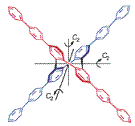Chemistry, Department of: Faculty Series

Andrzej Rajca Publications
Document Type
Article
Date of this Version
2009
Abstract
Helical supramolecular architecture, such as helical foldamers, supramolecular helicates and aggregates, helical molecules, macromolecules, and oligomers, is a fascinating topic of interest in chemistry and materials science. Although such supramolecular structures may provide advantages in the design of stimuli-responsive and functional materials, the weak nature of the noncovalent forces, as well as the dependency of the dynamic process on their local environments, may hinder their possible applications because of their limited structural stability and processibility. Stabilization of these supramolecular structures could be achieved by modification of the molecular backbone with specific functional groups that permit intramolecular cross-linking, in which covalent bonds fix the secondary structure with variable degrees of fidelity.
Includes Supporting Information (49 pp.).


Comments
Published in Angewandte Chemie International Edition 48:32 (2009), pp. 5954–5957; doi: 10.1002/anie.200901349 Copyright © 2009 WILEY-VCH Verlag GmbH & Co. KGaA, Weinheim. Used by permission.